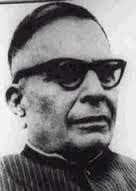
Nabakrushna Choudhury was an Indian politician and activist born on 23 November
1901 at Kherasa village of Jagatsinghpur District, Odisha, India. He served as Chief
Minister of the Indian state of Odisha. He dwelt from a landlord family. His father,
Gokulananda Choudhury was a great advocate. Nabakrushna had shown unusual talents
during his childhood. He was very fond of games and sports. Noticing that he was
devoting more time to games and sports, his father engaged a private tutor for him.
Subsequently he studied at the Peary Mohan Academy and completed his studies leading
to Matriculation Examination at the age of 14. He had to wait for two years and
eventually passed the examination with a good division.
In 1917, Nabakrushna
Choudhury took admission in the Ravenshaw College, Cuttack. When he was still continuing
his graduation at Ravenshaw college, he took part in the non-cooperation movement
along with Nityananda Kanungo, Loknath Patnaik, Jadumani Mangaraj and Harekrushna
Mahtab and left his course incomplete. In 1922 he got trained in Sawarmati Aashram
and started serving the motherland. In 1925 he joined for his graduation degree
again at the Shantiniketan. After completing his graduation he participated in the
freedom movement.
First imprisonment
Came the Lavana Satyagraha in 1920. This was in response to the Law enacted by the
British to disallow the people to get salt out of seawater in the coastal areas
of Gujarat and Orissa. Inchudi in Orissa came to limelight. Srijang was equally
active in another area – the movement against payment of Tax for Chowkidari. Nabababu
was the frontline leader in this movement, for which he was behind the bars for
four montFirst imprisonment.
Came the Lavana Satyagraha in 1920. This was in
response to the Law enacted by the British to disallow the people to get salt out
of seawater in the coastal areas of Gujarat and Orissa. Inchudi in Orissa came to
limelight. Srijang was equally active in another area the movement against payment
of Tax for Chowkidari. Nabababu was the frontline leader in this movement, for which
he was behind the bars for four months. This was the first imprisonment for him,
for which he did not regret at all. He utilized the prison time in studies and in
organising games and gymnastics for his fellow prisoners. In 1931 a son was born
to him. By that time, Gopabandhu Choudhury and his entire family were in the jail.
All of them were transferred to Hazaribag Jail.
Nabababu got the opportunity of meeting Minoo Masani, Ashok Mehta, Yusuf Mehrali
and Jayaprakash Narayan, and shared with them his thoughts on the freedom struggle
and the struggle of the poor to have two square meals a day. Surendranath Dwivedy,
Rabindra Mohan Das, and Nabababu’s close friend, Bhagawati Panigrahi were there
to be guided by his plans. Nabababu came to Tarikund after being released from Hazaribag
Jail. He created a small group within the Congress and began editing and publishing
a journal named ‘Sarathi’. For meeting the recurring costs of ‘Sarathi’, Malati
Devi sold her ornaments. ‘Sarathi’ was the mouthpiece of small farmers and labourers.
When the Congress Socialist Party was formed in India with Ram Manohar Lohia, Acharya
Narendra Dev and Jayaprakash Narayan as its founders, Nabababu’s small group was
merged in this. The Navayuga Sahitya Sansad was organized at his instance. Its aim
was to create progressive literature in Orissa.
When Odisha became a separate province in April 1, 1936, Nabababu contested in elections
of Odisha Legislative Assembly and won. He worked hard to make Odiya official language
of Odisha. He also made efforts and succeeded to stop Naxalites in Koraput. He was
elected to the legislative assembly in the year 1937. In 1946 he held the position
of Finance minister in Harekrushna Mahtab ministry. He resigned from his post because
of his son’s death in 1948. On 12th May 1950 he became the Chief Minister of orissa.
He worked as the Chief minister till 1956. Then he resigned from his post and left
the party and started serving the country. Some of his works include the first five
year plan for Orissa (1950-1956), the removal of landlord System, the law to make
Oriya language the official language, establishment of the agricultural university,
Baji Rout hostel for the students and many other laws to help the people.
|